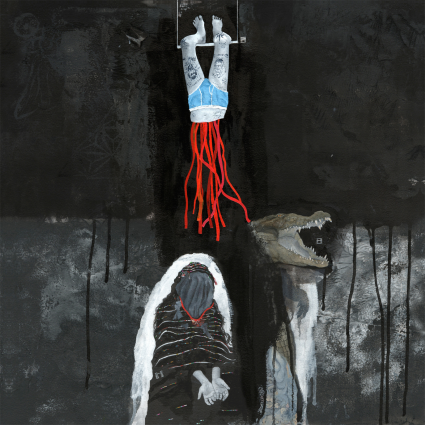With their debut Nachash, British progressive metal band Krokodil (not to be confused with the now-defunct 60s Swiss prog/krautrock act of the same name) have immediately announced themselves as a worthwhile addition to the current UK metal scene. But nothing less was expected of a band comprised of members of SikTh (bassist James Leach and drummer Dan Foord), Gallows (guitarist Laurent ‘Lags’ Barnard), Hexes (guitarist Daniel P. Carter), Cry For Silence (guitarist Alex Venturella) and Canaya (vocalist Simon Wright) – all of which are bands that have played a substantial part in increasing the popularity and legitimacy of metal/hardcore/punk in Britain in recent years.
Taking in a wide spectrum of metallic influences–including but not limited to Mastodon, Meshuggah, Converge, Isis, Neurosis, and Tool– this collective of celebrated musicians have done what other supergroups such as Killer Be Killed failed to do this year: they’ve made a cohesive album that doesn’t sound like the sum of its parts. Sure, the polyrhythmic force of Foord and Leach’s sinuous basslines add the same jaw-dropping technique that made SikTh one of the most influential/imitated metal bands of the last 10 years, but with Carter, Barnard and Venturella as a three-pronged guitar attack, hurling huge, juddering hardcore riffs and layering post-rock harmonies, Krokodil’s overall sound bears little resemblance to that of their individual members’ bands. And this is exactly what the group named after a heinous homemade intravenous opiate with necrotic side effects needed to do in order to make their music stand on its own two feet.
The first half of Naschash hosts the majority of the heavier songs, with Krokodil experimenting more with tempo, dynamics and melody as the album progresses. ‘Shatter’ explodes like an accident in a drug lab, recalling the same combustible prog metal that the missing-in-action band, The End, created on their 2007 album Elementary. Wright’s vocals crisscross guttural death metal growls and hot-headed hardcore shouts, while the three guitars increase their interplay before returning to bludgeon in unison towards an emphatic end. This approach doesn’t stop there; ‘Dead Man’s Path’ is a battering ram of a hardcore song. The gargantuan opening riff is dictated by Foord’s shifting double-bass drumming and when it drops into a half-time groove, it becomes abundantly clear that this song will destroy live when Krokodil support Mastodon across the UK this November.
Lazy comparisons to Mastodon will be made when it comes to Krokodil’s music, and like a lot of new bands like Trudger, Anciients and Pyres, the sound forged by Georgian heavyweights does feature throughout their music (for instance, the mid-section of ‘Skin Of The Earth’ is undeniably indebted to Blood Mountain), yet it’s rarely glaring and therefore it doesn’t feel like a pale imitation because their other inspirations are all sourced from numerous wells, inside and outside of metal’s bounds. ‘Reptiliar Familiar’, for example, has groove riff that Josh Homme would have written for Queens Of The Stone Age if he had of grown up on hardcore rather than the sermons of Sabbath. ‘The Collapse’ is a concise case of a band controlling the dynamics of post metal – slow-building, melodic verses and huge riffs during a chorus that Baroness would kill for. While the instrumental respite of ‘Ragnarok’ is a moment of delicate, Mogwai-esque beauty bookended by the jackhammer djent of ‘Sleep Well, Medusa’ and the roaring and soaring ‘Sun Riders’, featuring an understated guest vocal appearance by Biffy Clyro’s Simon Neil.
Granted, anyone with a keen eye for modern metal will be able to hear where Krokodil have taken their cues from. However, the seamless blending of these influences should come with future music and as mentioned, this does not take from your enjoyment of Nachash. Krokodil have been clever with their sequencing and there are some rather deft songwriting ideas throughout, whereby they seem to be heading down one route and then change their trajectory as a means to keep the listener on their toes. Even during the more traditional hardcore passages they still manage to intrigue and distance themselves from bands playing similar styles of metal at present. One of the main reason for this stems from drummer Foord who approaches his playing in a similar way to Intronaut’s Danny Walker; he constantly evolves his beats, creating intricacies in the music and in turn, elevating Krokodil to considerable heights for a new band.
While the unconfirmed but certain news that Krokodil guitarist Venturella is the new bassist for Slipknot may cast a sizeable overshadow over what Krokodil have achieved on their debut, Nachash sounds like a real band making real music and not a side-project from a bunch of experienced musicians bored with their day jobs, jerking each other off in the studio. There is substantial purpose to the music, and judging by both the magnitude of the riffs they wield and the addition of complimentary melody and songwriting light and shade during the latter songs, this is only the beginning of a bright future for Krokodil.
<div class="fb-comments" data-href="http://thequietus.com/articles/16755-krokodil-s-nachash-review” data-width="550">


